- Home
- Jack Kerouac
Atop an Underwood: Early Stories and Other Writings Page 20
Atop an Underwood: Early Stories and Other Writings Read online
Page 20
A sailor lay sprawled across his booth table, while his girl spoke to a tall soldier. The proprietor stood at the end of the glittering bar, watching. All things were mad in this hellhole of smoke and noise and wine. Two of the Military Police entered stiffly, looking about the misted, mad scene with stern approbation.
The pianist, cigarette waiting on piano top, talked casually, as he played, to a youngster in tweed. The drummer yawned, but his rhythm was imperishable ... his foot, with the precision of a machine, always came back to hit the bass-pedal, and the dancers, also imperishable, bounced in a body there in the rank smoke. The saxist’s cheeks, blown out, glistened in the dim light. The five bleary soldiers ordered more whiskey. The little waitress dodged through the multitude. Other waitresses crossed her path, wavered and dodged on. The proprietor withdrew a fat cigar from his vest and meditatively bit off the tip. A soldier shouted something at his girl, on the floor, and had to repeat it in her ear.
“You’re cute!” he informed her.
“Why corporal, what a line!” she shouted back, teeth white, eyes eager and glittering. They whirled madly, colliding with another couple, shouting pardons and laughing, inhaling the mad foggy smoke, bouncing with a rhythm.
Pete’s obese face was now examining the contents of a “Zombie” drink, horn-rimmed glasses directed critically at the decorations which topped the frosted glass.
A barfly pointed, toothlessly grinning: “Talkin’ to hisself. Arf-arf.”
The other barfly saw two obese faces, two sets of muttering lips, two horrid sets of horn-rimmed glasses. He heard, instead of the noise of the place, the sound of the Achaeans and the Trojans, clashing in Ilium.
“Talkin’ to hisself, hey?”
“Arf-arf,” said the other barfly. “Arf-arf.”
But outside, the quiet round moon beamed upon the lonely earth of Mississippi, illuminating the woods and fields and roads with a melancholy phosphorescence. A solitary figure advanced along the side of the highway toward the mad roadhouse, in front of which, in blazing incandescent legend, was said: “Pepi Martin’s.” Scores of cars were parked in the silent driveway, all of them except one bearing a Mississippi license plate—the lone stranger being from New York. The solitary figure, who now had a bottle of gin in one hand, stood swaying before the New York car and frowned at the plates.
“New York,” he breathed, swaying.
Two Military Police emerged from the roadhouse, allowing a blast of smoky madness to scream in the silent night, and then closed the door behind them, trapping the inmates. Their heavy shoes crunched across the drive. A moment later, they were bouncing away in a “Jeep” car, two sad soldiers in a little brown car, moving swiftly down the road.
Our solitary figure, whom we may know as Richard, now seated himself upon the running board of the dilapidated New York car, and busied himself to uncork the bottle. It was a pint bottle, already half emptied. The music, especially the muffled bass-foot, boomed from within. Richard smirked and threw the bottle to his lips.
“New York,” he gasped, letting down the bottle. “Little old New York.”
A car crunched into the drive, both headlamps flinging a swath across the distant field behind the roadhouse. Richard followed the lights, saw one lonely tree, a little mist, and then the lights were clicked off. Seven persons alighted from the car, and chattering and laughing happily, made their way to the door. Once more, the door opened, the night silence was burst with revelry in Pepi Martin’s; and once more, the door closed, the sad summer breeze returned to Richard’s ear. Far, far away, a train whistle screamed. Richard allowed his gaze to follow the winding highway, and saw, at regular intervals, the sorrowful streetlamps.
“America,” breathed the youth. “America!”
And he was lonely and alone.
Obese face, sweating over a Zombie, muttered underneath the din inside the rocking roadhouse: “Oh ... the moon never beams, ... without bringing me dreams, ... of the beautiful Annabel Lee ... and the stars never rise ... but I see the bright eyes ... of the beautiful Annabel Lee ...”
“Arf-arf!”
“Hisself!”
“... in her tomb by the sounding sea ....”
The proprietor’s cigar billowed smoke. He beamed, as he saw the seven new customers; he beamed, like the moon in Poe.
The drunken sailor, sprawled across his cups, did not see his girl as she rose to dance with the tall soldier. He had come all the way from Louisiana to see her, on leave, and now she was dancing with a tall soldier, bouncing around the floor, laughing, colliding, smoking.
“What a lovely dive!” uttered one of the seven new customers.
“I have a hunch I won’t be bored here,” his girl shouted to him. She was tall, her eyes sad, her brow constantly furrowed with pity.
Obese Pete saw her from his stool at the bar, forgot Annabel Lee. The five dreary soldiers drank and drank, thinking about the War. They sat erect, with drooping eyes. They were from Massachusetts, Virginia, Florida, Utah, and Massachusetts. One of the soldiers from Massachusetts, a tall thin fellow with glasses, rose from his seat with a smile and burrowed his way through the mass of humanity. The next instant, he was on the floor with a girl, and the very next instant, they were bouncing with the beat, smiling to each other, colliding, laughing, gyrating to the din. The bartender’s assistant dropped a slice of orange into a Tom Collins and dashed forward with his finished masterpiece, almost colliding with the bartender, who was dashing in the opposite direction toward the Scotch.
But outside, it was America in the night. The real, true, America, America in the night. Richard sat with bowed head upon the old running board, and far across the slumbering land, he heard the flung strains of a distant engine whistle.
And now, he heard the band in Pepi Martin’s strike up the quiet blues. Presently, the introduction meandered into the strains of “Blues in the Night!”
[“My mama done tol’ me, when I was in kneepants, my mama done tol’ me ... Son! A woman’ll sweet talk ... and give ya the big eye ... but when the sweet talkin’s done ... a woman’s a twoface ... a worrisome thing ... that leaves ya t’ sing ... the Blues in the Night ...”]
Richard looked up, and saw etched against the moon, the grief-stricken telephone wires of America. He wept in his drunkenness, alone outside of Pepi Martin’s gay roadhouse in Mississippi. Wept in the Night, seated on obese Pete’s old running board. Deep down in his heart, a voice tried to speak, but could not. In a welling up of tears, and music, Blues music, it said: Does the goodness of Christ shine with the moon and with the sad lamps? Does his voice moan with the train whistle? Christ returns to America, at night. Magic night is the time when wonder steals into our hearts. We know then, as never, that life is a strange and beautiful dream, and nothing else. Oh, life is bitter beauty. Oh, life is awful glory. Oh, Christ!
(What happened to Richard? Nothing. He was merely drunk, and it was America in the Night, and the Blues were playing, and the train whistle was blowing across the meadows of Night. Pity. Sadness. Dream. Love. Grief-stricken beauty. Hope of our land.)
I have traveled to distant cities, said the famined heart of Richard, and I have seen how cruel is man. Cruel wretch! I am only youth, but I swear I know ...
“The nightingale sings the saddest song I know ... he knows things are wrong ... and he’s right ...”
And he wept, remembering the gaiety in Pepi Martin’s, remembering the sad lamps of night. Christ! his famined heart cried, if tears shall wash away the cruelty of our years, and sow the seeds of pity in our black, broken hearts, and remind us that life is brief and lovely, not long and foolish, that it is strange and beautiful, yea as a dream, then so let it be, if it must be tears, if tears alone may serve ...
Crack! The drummer had struck his rim-shot, and the band was off once more on a mad swing tune, and the dancers howled with delight, and smoke clung to the rocking rafters. Din! Din! Din!
The drunken sailor was sprawled across his cups, and the sho
uting went on all about him; and the music rebounded from beam to beam, bouncing and bouncing in steady stream.
The door opened, and in staggered Richard. The proprietor’s eye hardened. Richard moiled across the little room, lost in the din and smoke, and made his way toward the Men’s Room. Inside, he reeled against the wall and tried to read a penciled epitaph.
“What rhetoric!” said a horn-rimmed face beside him.
“Fragments of Milton!” muttered Richard.
He looked through the horn-rimmed glasses and saw two friendly eyes, two sad eyes.
“You’ve read Milton?” asked Pete.
“Some.”
“Ah, ... then, you’ve probably read Emerson.”
“Some.”
“What do you think of his essay on Compensation? My name is Pete Miller. What’s yours? I’m from New York. Where are you from? I am studying America in my jalopy. Where are you sitting?”
Richard laughed, loud and long.
“Blues in the Night,” he answered drunkenly. “My name is Johnny Dreamer. Christ returns to America, in the night. Dreamer’s my name.”
“Well then, Dreamer, come on over and sit with me,” cried Pete drunkenly. “I am studying America in my jalopy.”
They left the Men’s Room and pushed their way through the mass of people. At a little table in the corner, Pete ordered two drinks, and then directed his horn-rimmed stare at Richard.
“I,” he began, “am writing a novel called ‘The Wound of Living,’ and it is my theory that Life, which begins in perfect innocence, and in relatively perfect health, ends in deep wound and deterioration. The very definition of life is the disintegration of it. That is why I fear nothing. Have you noticed that nice looking girl in the other booth? Do you write also?”
Richard looked over to the next booth, but saw nothing to speak of. The seat began to reel.
“I am not a writer,” he shouted to Pete above the din. “I play tenor sax in college. I am studying nothing in particular, since I want some day to play sax for a big-name band.”
“What college?” asked Pete, shouting.
“Princeton,” cried Richard. “I’m home for the summer, and I feel lousy, because for some reason or other, I am bored and lonely. See?”
“I see!” shouted Pete with his honest eyes. “You’ve been wounded!”
The drunken sailor had by now turned over, and his drunken face was revealed to all who cared to look ... a little mustache under a large nose. From the general direction of the bandstand, music leaped through the fogged air in great bouncing gobs, and the dancers gyrated and gyrated until Richard had to take hold of his seat or fall to the floor. Pete was shouting:
“Dreamer! I would say you were drunk!”
A waiter dashed over nervously, shouting:
“Everythin’ all set boys?”
“Right,” assured Richard, holding up an assuring finger.
The waiter darted off, dodging expertly.
“I’m glad I met you,” shouted Pete. “I wanted someone to talk to. I’m running all around the country in my jalopy. New Orleans is my next stop.”
“Glad I met you,” howled Richard. “I was feeling pretty low just a moment ago. I’m drunk, you know.”
Two female eyes were fixed on the eyes of Richard. He blinked, then looked carefully. Yes, she is looking at me. I shall dance with her.
Richard rose; “Excuse for a minute Pete. I am going to [take] advantage of a momentary infatuation. This girl is ogling me on.”
“Bravo!” screamed Pete, raising his drink to mobile lips. He always spoke through stiff, careful lips, in deep, correct tones. “It’s the girl I was telling you about. Bravo!”
Richard reeled through the smoke, toward the two eyes.
“Dance?” he said into her ear. She was one of the seven in the new party of customers.
“Hmmm,” she smiled melodiously. “I certainly shall.”
A moment later, they were clutched to each other, elbowing through a solid mass of dancers.
“Lovely night,” whispered the girl in his ear.
“What’s your name?” asked Richard.
“Annabel,” she answered, breathing warmly. Everything, to Richard, was giddy and absolutely wonderful. His remembrance of Blues in the Night was vague, triumphant. He remembered also the fields that surrounded Pepi Martin’s, hushed and patient in the night. And the sad lamps, and the goodness of Christ, and the warmth of Life, and the bitter beauty, and the awful glory, and his saxophone back in New Jersey moaning in trembling tremolo of the day when he should ever meet two such sad eyes and such a pity-furrowed brow. And the yielding waist.
“I have the Blues in the Night,” cried Richard, triumphantly.
“I too,” she whispered in his ear. Strange and beautiful dream, come to me, now. I am giddy.
Then, the next thing he knew, Richard was seated back with Pete, and Annabel was beside him, her head upon his shoulder.
Pete was talking, talking, but Richard could hear nothing. Pete’s obese spectacles were rolling in slow undulations, and Annabel’s head was light upon his shoulder. And in his ear, the incessant boom of the bass-pedal mingled with the rancid, beery air.
Then the three of them were out in the drive, feet crunching in the pebbles, and Richard was howling to the moon: “Alms for the Love of Allah! Alms for the Love of Allah!” The air screamed with purity.
“Allah!” echoed Annabel.
“Is your second name Lee?” asked Pete.
“Wiley!” she corrected, pinching Pete’s ear.
Then they were in Pete’s jalopy. The car lurched from the drive, leaving Pepi Martin’s. Then the black tar road began to unwind, like a great black snake, uncoiling. Dark night winds rushed around the car, and Pete turned on the radio. Annabel sat between the two youths, singing with the music from the radio.
“What!” howled Richard drunkenly, “What circumstance, what beautiful circumstance, brings the three of us together upon this night of June 8, in this year of grace, in this little jalopy, swerving through America in the Night, with the sad meadows of Mississippi riding past in infinite wisdom? ...”
“Secret forest of the night,” shouted Pete, driving.
“What circumstance?” insisted Richard. “I shall tell you ... it is the famished heart, the poor starving heart ... I am alone, and drunk, and lonesome ... and I meet Pete ... and I meet Annabel ...”
“Oh! the moon never beams,” began Pete, “without bringing me dreams ...”
“And Annabel meets Pete, and Pete meets Annabel. And I meet Annabel, and Annabel meets me. And I meet Pete, and Pete meets me ....”
“... nor the demons down under the sea, can ever dissever my soul ... from the soul ... of the beautiful Annabel ... Wi ... Lee....”
And Annabel sang with the music.
The power and glory of Bacchus!! Why, world, should it be the work of Bacchus to unburden the famined hearts of the earth? Why not you, world?
Suddenly, with the music roaring in their ear[s], and the wind flapping about the car in cold blasts, they were not riding in the road, but beside it in a field, and the tires were screeching, and the road itself had curved off to the left, a bit insultingly. Richard, arm draped over the right front door of the little coupe, suddenly realized that the car was about to turn over, and upon his draped arm. But there was no time for fear. The headlamps illuminated a large tree, which was now riding toward them very speedily, very insultingly. Every bit of the bark was plainly legible. It came near to hitting Richard’s draped arm, but didn’t. It rode into the car at the right front fender. There was a dull biff.
“Surely, this has happened to me before, perhaps in a dream!” thought Richard, as he tumbled slowly from the car along with the door. Then he was rolling lackadaisically in the grass, and then he was staring up at the stars and the moon. It was nothing, he thought. Death is nothing. I am dead.
But those were real stars, and that was a real breeze, chilled with night. Perhaps I
am not dead. I shall see. Richard rose to his feet, and then fell on one knee. He rose again, and his legs gathered strength. From somewhere came the quiet sound of trickling water, but outside of that, there was utter silence. A door from a nearby farmhouse was flung open.
Richard reeled forward, and saw the car, which had just now been moving along in grand style, now leaning sadly and wearily against the tree, crushed within itself like an accordion. It was very sad, thought Richard. The poor sad little car, stopped and melancholy. A piece of glass tumbled within the wreckage. The water trickled on. The radio had stopped.
This had not happened, because I am Richard Vesque, and Richard Vesque was not born to be in an automobile accident on June 8. No, it has not happened, for I am Richard. Things like these happen in the papers and in the movies, but not in real life to Richard Vesque, the Princeton boy.
Richard was keenly conscious of a terrific headache. He walked around the wreckage, and the next thing he knew, he was cursing, cursing with foul words. For there lay Pete, flat upon his back, beside his little jalopy, stopped and with no more radio music. The horn-rimmed glasses were pointed stolidly toward the stars.
Where is Annabel?
Richard staggered to the wreckage, and peered into the mangled front seat. There was a patch of her dress. Richard touched it, and realized to his horror that it was her flesh he was feeling underneath that patch of dress. He grabbed, knowing then that it was her upper arm. Richard heaved, wincing as the wreckage groaned reluctantly. Richard tugged, and the wreckage tinkled, collapsed in small places, groaned. The poor flesh of Annabel, tugging against steel wreckage.
Weakly, Richard now withdrew the girl’s bulk from the tangle of steel and dragged her to a standing position. Then he lifted her into his arms and with watery knees, lurched forward toward a patch of thick grass. When he had deposited her gently upon the grass, a flashlight cut into his eyes, and then fell upon Annabel’s body. Someone had come.

 Tristessa
Tristessa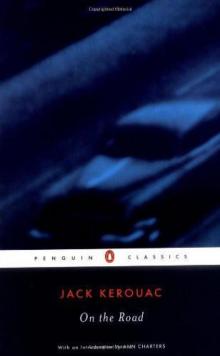 On the Road
On the Road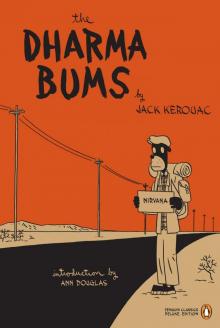 The Dharma Bums
The Dharma Bums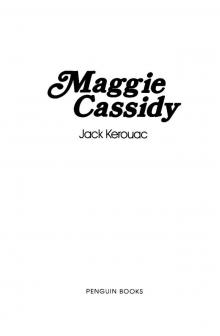 Maggie Cassidy
Maggie Cassidy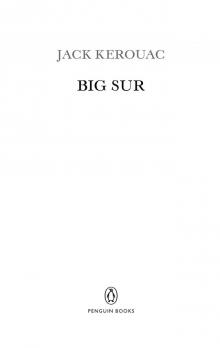 Big Sur
Big Sur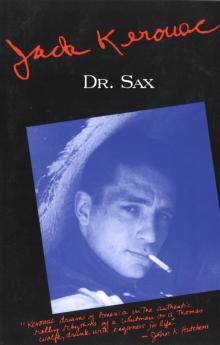 Dr. Sax
Dr. Sax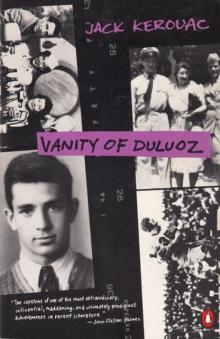 Vanity of Duluoz: An Adventurous Education, 1935-46
Vanity of Duluoz: An Adventurous Education, 1935-46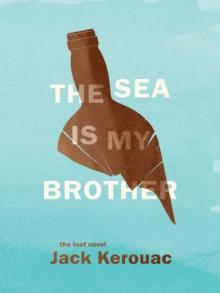 The Sea Is My Brother
The Sea Is My Brother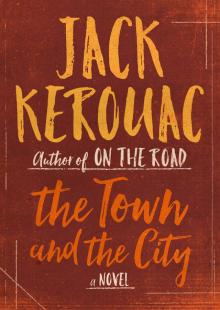 The Town and the City: A Novel
The Town and the City: A Novel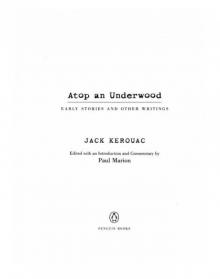 Atop an Underwood: Early Stories and Other Writings
Atop an Underwood: Early Stories and Other Writings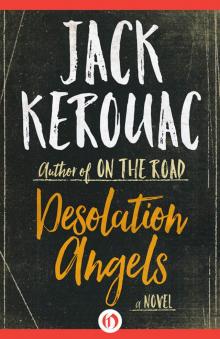 Desolation Angels: A Novel
Desolation Angels: A Novel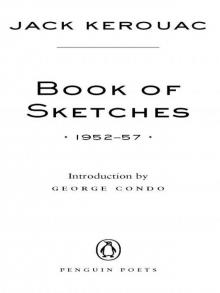 Book of Sketches
Book of Sketches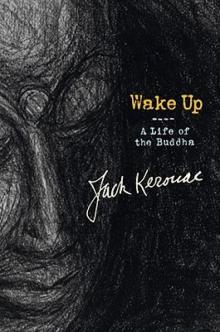 Wake Up: A Life of the Buddha
Wake Up: A Life of the Buddha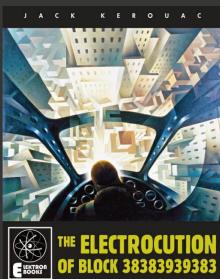 The Electrocution of Block 38383939383
The Electrocution of Block 38383939383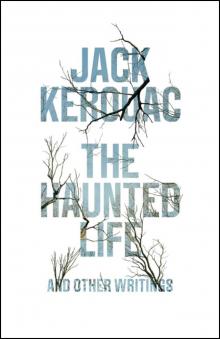 Haunted Life
Haunted Life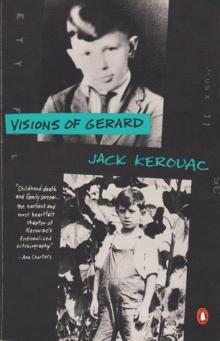 Visions of Gerard
Visions of Gerard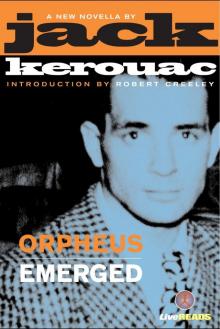 Orpheus Emerged
Orpheus Emerged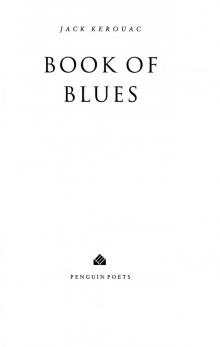 Book of Blues
Book of Blues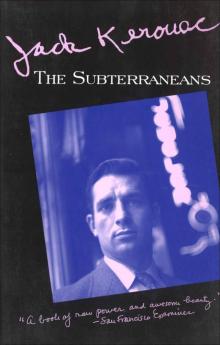 The Subterraneans
The Subterraneans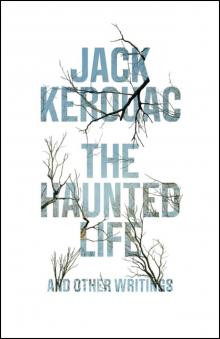 The Haunted Life
The Haunted Life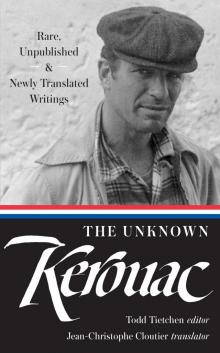 The Unknown Kerouac
The Unknown Kerouac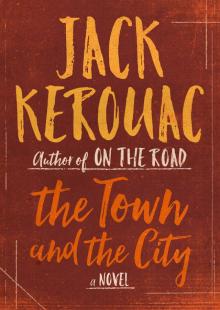 The Town and the City
The Town and the City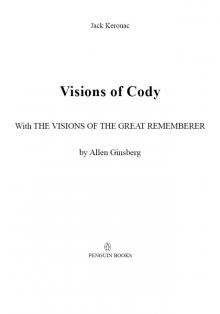 Visions of Cody
Visions of Cody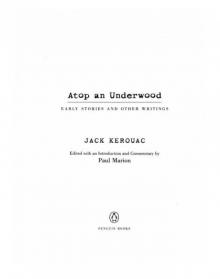 Atop an Underwood
Atop an Underwood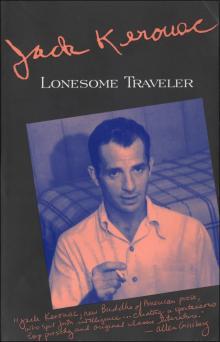 Lonesome Traveler
Lonesome Traveler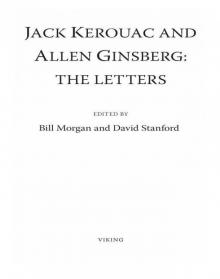 Jack Kerouac and Allen Ginsberg
Jack Kerouac and Allen Ginsberg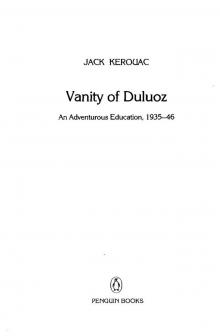 Vanity of Duluoz
Vanity of Duluoz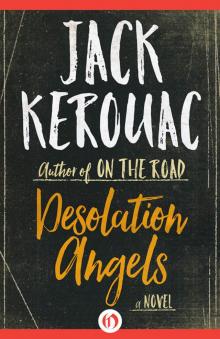 Desolation Angels
Desolation Angels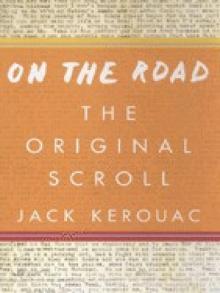 On the Road: The Original Scroll: (Penguin Classics Deluxe Edition)
On the Road: The Original Scroll: (Penguin Classics Deluxe Edition)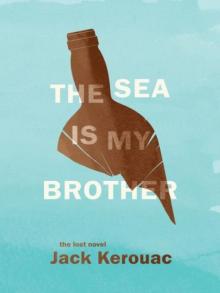 The Sea Is My Brother: The Lost Novel
The Sea Is My Brother: The Lost Novel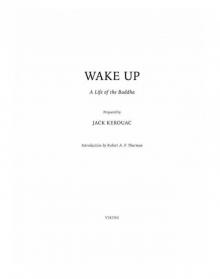 Wake Up
Wake Up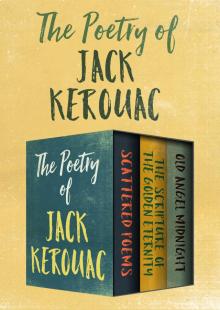 The Poetry of Jack Kerouac
The Poetry of Jack Kerouac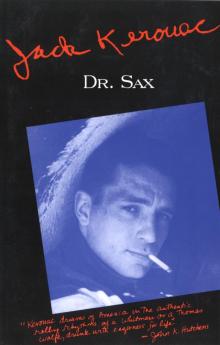 Doctor Sax
Doctor Sax